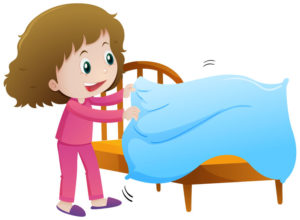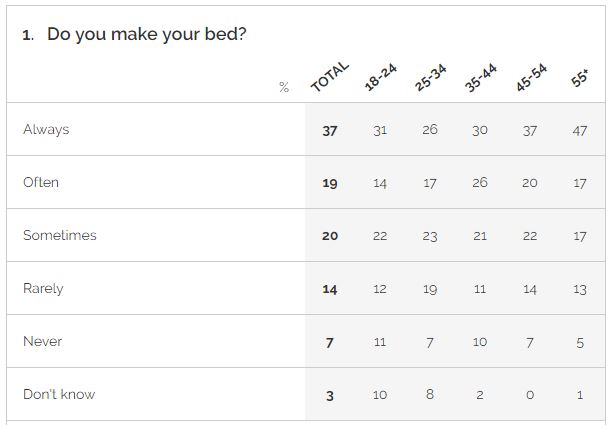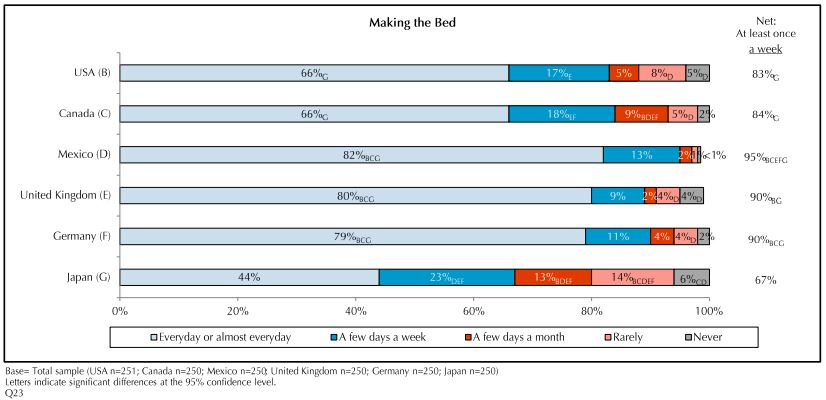You’ve Made Your Bed, Now…Don’t Mess it Up!

I’m kind of bummed out. I missed Make Your Bed Day last month on the 11th!
Did you know there was a special day recognizing making your bed? I guess we shouldn’t be too surprised at these “days” anymore. After all, there’s a day set aside for everything now. Make Your Bed Day? Why not.
When I was little, my mom taught me how to make my bed. Yours probably did the same for you. Mom made her and my dad’s bed every day, and the same was expected of us kids, once we were capable. I remember struggling to reach far enough on my short little legs and tippy-toes, trying oh-so-hard to straighten and smooth the sheets on my twin bed with my short little arms. I remember trying to fold the corners like Mom showed me and tuck the sheets and blankets in neatly with my not-so-coordinated hands. And finally, I remember trying to get my pink flowered bedspread on completely straight. It seemed nearly impossible. It was so huge, and I was so small.
My results were rarely up to my own self-inflicted standards much less, I’m sure, Mom’s. But she was a patient parent and knew that learning and perfecting takes time, practice and maturity, and she allowed me to improve gradually and without judgement.
Once a teenager, and through most of my adulthood, I’ve been an intermittent bed-maker. For some reason, I go through long stretches where I don’t have the time or – more honestly – the will to do that one additional task on busy and rushed mornings. I just leave it rumpled and unmade, and at night I get right back in exactly how I left it that morning.
Then there are the periods when I faithfully make my bed (nearly) every day for months or years. Somehow it feels so satisfying to run my hands over the sheets and make everything look orderly and pretty. I love the feeling of walking out of the bedroom and glancing back at my neat bed and plumped pillows, all ready to greet me later that night.
There’s something so pleasurable about sliding my tired self into a smooth, made bed at night. Getting into bed always feels great, but there’s a visual pleasure in seeing the straight, flat bedclothes and the fluffed pillows in perfect position. And there’s a luxuriousness in the ritual of turning down the covers and climbing into a bed that looks and even feels cleaner and fresher. Is it cleaner than an unmade bed? Probably not, but it sure does feel like it to me.
I honestly don’t know why I go from one extreme to the other. Maybe a switch in my brain goes off or something. Maybe I’ll never know the reason. But I must say, I prefer it when I’m in bed-making mode. It feels more orderly. More complete.
All this thinking about making my bed tweaked my curiosity, and I wanted to know more about it. Like, how many people actually make their beds every day? A couple of times a week? Only when company is coming? Screw it…never? And what does it say about us whether we make our beds or not?
Do We, or Don’t We?
According to National Sleep Foundation’s 2013 International Bedroom Poll, 66% of Americans make their bed (or have it made by someone else…nice!) every or nearly every day. 17% do it a few days a week, 5% a few times a month, 8% rarely and 5% never make their bed. The survey makes special note that 83% of Americans make their bed at least once a week. Canada’s numbers are not too different. Pretty impressive!
Folks in Mexico won the prize for most beds made every day with the UK and Germany a close 2nd and 3rd. Mexico won again for most beds made at least once a week at 95% (right here I’m bowing and saying “we’re not worthy” a la Wayne’s World. Yes, I’m a geek) Japan made their beds less than all other countries represented in the poll.
I don’t know if things have changed in the U.S. in the ensuing five years, but a 2018 YouGov survey in which 4,410 adults were asked “Do you make your bed?” indicated that only 37% always do. And I have to admit to being perplexed by the 3% who answered that they don’t know. In the 18-24 age group, 10% of them didn’t know if they make their bed? Hmm…

Do the Experts Really Know What It All Means?
But what do our making or not-making of our beds habits say about us? In yet another recent survey conducted by now-defunct Hunch.com, 68,000 people responded to several questions about their bed-making habits and other characteristics of their lives. This survey indicated that only 27% of respondents make their beds every day.
This survey also indicated that overall, daily bed makers said they were happy, likely to enjoy their jobs, and felt well-rested, whereas those who didn’t make their beds more often said they were unhappy, didn’t like their jobs, and woke up tired.
We can’t make a decent argument that if you are unhappy and start to make your bed every day, you’ll magically become a contented, well-rested worker and person in general. Obviously, making your bed can’t directly cause you to be happier. It may make you feel better in that moment, but it can’t possibly turn you into a happier overall person. However, it may say something about the type of person who finds it necessary and positive to start the day by making their bed. Or maybe not! Hard to tell with just this one (unscientific) survey. But why might it make you feel happier?
Is it having a habit or routine? Is it self-discipline? Maybe it’s having an orderly environment or the feeling of accomplishment of this small, early-morning task. This is one of those things that would be tough to draw direct lines between. After all, we don’t only make our beds and live our lives in a vacuum. There’s a whole lotta other stuff that makes us who and how we are.
All we can do is try it for ourselves both ways and see the results in our own lives.
Right now, for whatever reason, I am in happy, every day bed-making mode. I hope it lasts!

